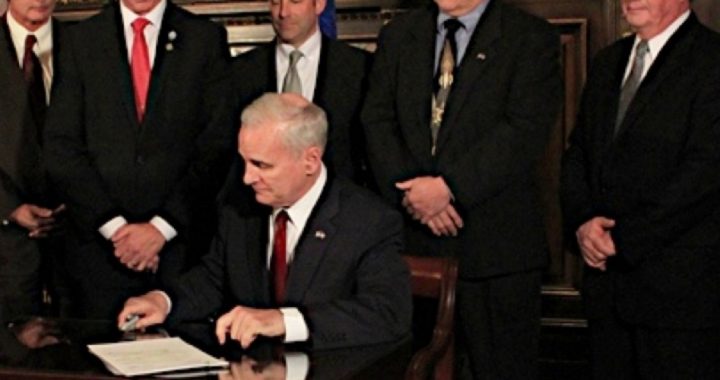
Governor Dayton of Minnesota has vetoed a bill passed by the state legislature that would have required that any facility which performs ten or more abortions per month to be licensed by the Minnesota Commissioner of Health and that the annual licensing fee be $3,712. The fee would be used to cover the licensing process and the inspections of the abortion clinics. The clinics could be subject to up to two surprise inspections per year and a clinic could lose its license if it would found to have engaged in fraud, dangerous health practices or illegal activity.
Governor Dayton defended his veto, saying that the language was “inappropriate and unworkable” and that it was unfair to single out abortion clinics. He veto message said that “If regulation of clinics were the concern, the bill should have required licensure of all clinics, not just a select few.” Dayton also complained that a lack of oversight at abortion clinics was “not an issue” in Minnesota and he noted that other state agencies that oversaw building codes, workplace safety, and physician licensure were adequate. Governor Dayton also cited as an insurer of clinic safety the National Abortion Federation, which, he noted: “sets clinical policy for performing abortions.”
Governor Dayton’s reliance on the National Abortion Federation may have been a poor idea. In 2011, the organization was caught in a firestorm when it came to light that its representatives were aware of dreadful conditions at a Philadelphia abortion clinic. The director of that clinic, Kermit Gosnell, is now on trial for the murder of one of the women upon whom abortions were performed and the murder of seven newly born babies (not fetuses.)
Among other things, at Gosnell’s clinic there was broken equipment, there were inadequate or missing medical records, there was an absence of protocols and compliance with protocols dealing with very basic medical care — such as taking the vital signs of patients under sedation. The grand jury which indicted Gosnell specifically criticized the National Abortion Federation for failing to report Gosnell to authorities, especially as its stated mission was to “promote health and justice for women.”
Mainstream media, like MSNBC, described Gosnell’s abortion clinic as a “house of horrors” that was filthy and foul smelling. It noted that although Gosnell is on trial for eight murders, that perhaps hundreds of other babies died there. Philadelphia District Attorney Seth Williams at a news conference said: “My comprehension of the English language can’t adequately describe the barbaric nature of Dr. Gosnell.” His office described the case as a “complete regulatory collapse.” The grisly conditions at Gosnell’s clinic became an issue during state legislative races in Minnesota last year.
Scott Fischbach, Executive Director of Minnesota Citizens Concerned for Life blasted the governor’s veto: “Once again, Governor Dayton has come to the defense of the abortion industry at the expense of women’s safety. This is the seventh pro-life initiative that would protect women and unborn children that has been vetoed. The Dayton record is now clear: he is no friend of women or their babies.”
Bill Poehler, Communications Director with Minnesota Citizens Concerned for Life, said that government oversight is also insufficient because there is a loophole in state licensing regulations which allows abortion clinics to avoid the more stringent regulations which apply to other out-patient surgical facilities. Poehler said: “They’re trying to claim that we singled them out but it’s just the opposite. Abortion clinics have a special exception now, and we don’t believe that is just or in the interests of women. Our intent was to put into place some very basic and reasonable licensing requirements.”
Poehler also said: “Clinics are places where people go for general medical care, if they have an infection, or an allergy, or a virus or something.” But, he noted, the treatment given at abortion clinics is “very narrow” and is, in fact, “primarily” surgical abortions. Although Poehler acknowledged that there are probably not enough votes to override the governor’s veto, the bill was helpful in drawing attention to the problem of poor oversight of abortion clinics. He added: “We will probably launch an effort to inform women that they enter these places at their own risk because the State Department of Health cannot guarantee their safety.”
Photo: On another occasion, Governor Dayton signed a bill implementing environmental permitting reforms.



